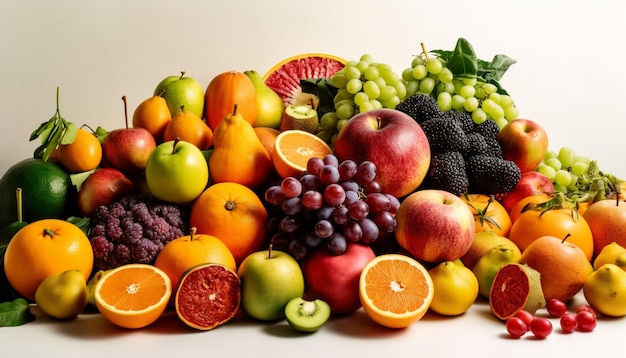Normal metabolic processes in our bodies promote oxidation, a stage of metabolism where free radicals are produced. Everyday activities like eating, breathing, and physical exercise all contribute to the oxidation process and the formation of free radicals. Over time, excessive free radicals can damage cells, organs, bones, joints, and the immune system. This slow accumulation of damage is actually what causes the visible signs of aging and contributes significantly to the aging process.
The Best Dietary Antioxidants
Antioxidants come in many forms and can be found in virtually all foods, whether from plant or animal sources. Generally, natural plant foods are the best source of antioxidants and offer additional nutritional benefits. While antioxidant supplements can be helpful, food-based antioxidants are believed to be more effectively absorbed by the body.
Here are some of the best dietary antioxidants that you can easily find in natural, whole foods:
Anthocyanidins
Anthocyanidins are plant pigments found in foods such as blueberries, which may protect against DNA damage from UV radiation. Studies suggest these pigments might offer antidepressant effects and benefits against lung and colorectal cancer, cognitive decline, and even gluten intolerance.
Food sources include: oranges, cherries, berries, eggplant, radishes, red grapes, and red wine.
Beta Carotene
Beta Carotene, a member of the carotenoid family, is found in many fruits, grains, oils, and vegetables. Recognizable by its orange-red color, it is a precursor to vitamin A and requires dietary fat for proper absorption. Beta Carotene is well-known for benefiting eyesight, and studies suggest it plays a key role in preventing age-related macular degeneration.
Food sources include: carrots, broccoli, spinach, kale, cantaloupe, mangoes, apricots, goji berries, squash, pumpkin greens, and sweet potatoes.
Caffeic and Ferulic Acid
Derived from the biosynthesis of plant compounds, caffeic and ferulic acids have impressive antioxidant effects. Caffeic acid can fight inflammatory diseases, while ferulic acid might be beneficial for mood disorders.
Food sources include: apples, pears, oranges, pineapple, artichoke, coffee, peanuts, oregano, turmeric, steel-cut oats, rice, kale, basil, thyme, and rosemary.
Flavonols
Flavonols, found in various fruits, vegetables, tea, spices, and herbs, are well-known for their anti-inflammatory properties. The antioxidants quercetin and kaempferol are types of flavonols, and they offer benefits like improved blood sugar control and skin health.
Food sources include: apples, apricots, raspberries, cocoa, chocolate, blackberries, onions, red wine, and green and black teas.
Flavanones
Flavanones, another type of flavonoid, boast potent anti-inflammatory activity. Studies in humans and animals show neuroprotective effects, and these compounds support the digestion and absorption of carotenoids from foods like carrots and bell peppers.
Food sources include: oranges, lemons, limes, grapefruit, and milk thistle.
Lutein
Similar to beta carotene, lutein is a carotenoid plant pigment important for eye health. It occurs naturally in green vegetables, fruits, and some animal products. Lutein may reduce the risk of cataracts and age-related macular degeneration.
Food sources include: spinach, kale, collard greens, broccoli, parsley, green peas, carrots, celery, squash, okra, egg yolks, and pumpkin.
Lycopene
Lycopene, another carotenoid, is responsible for the red pigment in many fruits and vegetables. Particularly rich in tomatoes, lycopene is a strong antioxidant that may help fight cancer and improve heart health by increasing HDL cholesterol (the “good” cholesterol).
Food sources include: spinach, pumpkin, squash, papaya, watermelon, red bell peppers, red (pink) grapefruit, and sweet potatoes.
Proanthocyanidins
Proanthocyanidins, a type of flavanols, may support blood vessels and cardiovascular health. High amounts are found in cacao (chocolate), which is why it is known for its health benefits. Studies suggest they are much more potent than vitamin C and may even act as an internal sunscreen, protecting the skin from UV radiation.
Food sources include: apples, red grapes, red wine, cranberries, strawberries, cinnamon, peanuts, chokeberry, and black and green tea.
Sulforaphane
Sulforaphane, a sulfur-based antioxidant found in cruciferous vegetables, has been linked to various health benefits including discouraging breast and colon cancer tumors. It also supports normal blood pressure, heart health, cholesterol levels, and balanced blood glucose.
Food sources include: broccoli, cabbage, cauliflower, kale, turnip, Brussel sprouts, radish, collard greens, and watercress.
One Final Thought
Incorporating more antioxidants into your diet is always a good idea for overall health. However, remember that while antioxidants are beneficial, they are not a substitute for pharmaceutical medications. Vegetables, fruits, nuts, and seeds are excellent sources of dietary antioxidants, so aiming for a diet comprised mainly of these foods should enhance your antioxidant intake significantly.

